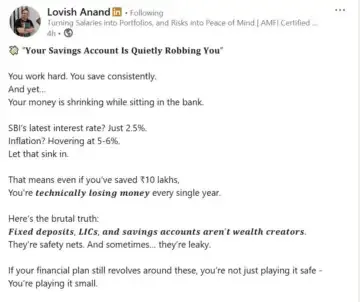
You save diligently. You cut back on luxuries. You park your hard-earned money in a savings account or a fixed deposit, thinking it’s the safe and responsible thing to do.
But what if that very habit is .Financial advisor Lovish Anand has issued a sharp reality check for Indian savers in a recent LinkedIn post titled: “Your Savings Account Is Quietly Robbing You.”
Anand said most Indians still rely heavily on traditional instruments like savings accounts, fixed deposits, or LIC policies for financial planning. But these tools, he warns, aren’t keeping up with inflation, and in many cases, are actually reducing your purchasing power over time.
The disparity between interest rates and inflation is significant, with SBI’s savings account interest rate at just 2.5% while inflation hovers around 5-6%. “SBI’s latest interest rate? Just 2.5%,” Anand pointed out, “Inflation? Hovering at 5 to 6%. Let that sink in.”
The impact of this imbalance is stark. Even with significant savings, such as 10 lakhs, individuals are technically losing money every single year. Anand describes fixed deposits, LICs, and savings accounts as “safety nets” that can sometimes be “leaky,” highlighting that while they offer security, they do not foster wealth creation.
Anand suggests moving past outdated financial habits that . “Fixed deposits, LICs, and savings accounts aren’t wealth creators,” he says. “They’re safety nets. And sometimes… they’re leaky.” He emphasizes, “If your financial plan still revolves around these, you’re not just playing it safe, you’re playing it small.”
To mitigate the erosion of wealth, Anand advocates for a strategic shift based on individual risk appetites. He suggests exploring alternatives like index funds, mutual funds, hybrid funds, and arbitrage funds. “These are low-cost or professionally managed options that can help your money grow instead of gathering dust,” he said.
Anand’s remarks reflect a broader trend towards more dynamic and growth-oriented financial instruments, which offer the potential for better returns compared to traditional savings methods. He asserts, “Your money deserves to grow,” and warns against letting it “sit idle while inflation chips away at its value.”
By embracing newer financial tools tailored to diverse risk profiles, savers can potentially enhance their financial outcomes. The objective is to transition from merely preserving wealth to actively growing it in a way that outpaces inflation and meets personal financial goals.
The call to action is clear: “It’s time to rethink your money strategy. Depending on your risk appetite, consider smarter alternatives.” These alternatives include index funds for low cost, long-term wealth compounding, mutual funds that are professionally managed and tailored to your goals, hybrid funds balancing growth and stability, and arbitrage funds as a low-risk alternative to idle cash.
Anand’s insights encourage savers to critically evaluate their financial plans and adapt to the evolving economic environment, ensuring their savings work effectively towards securing their future financial security.